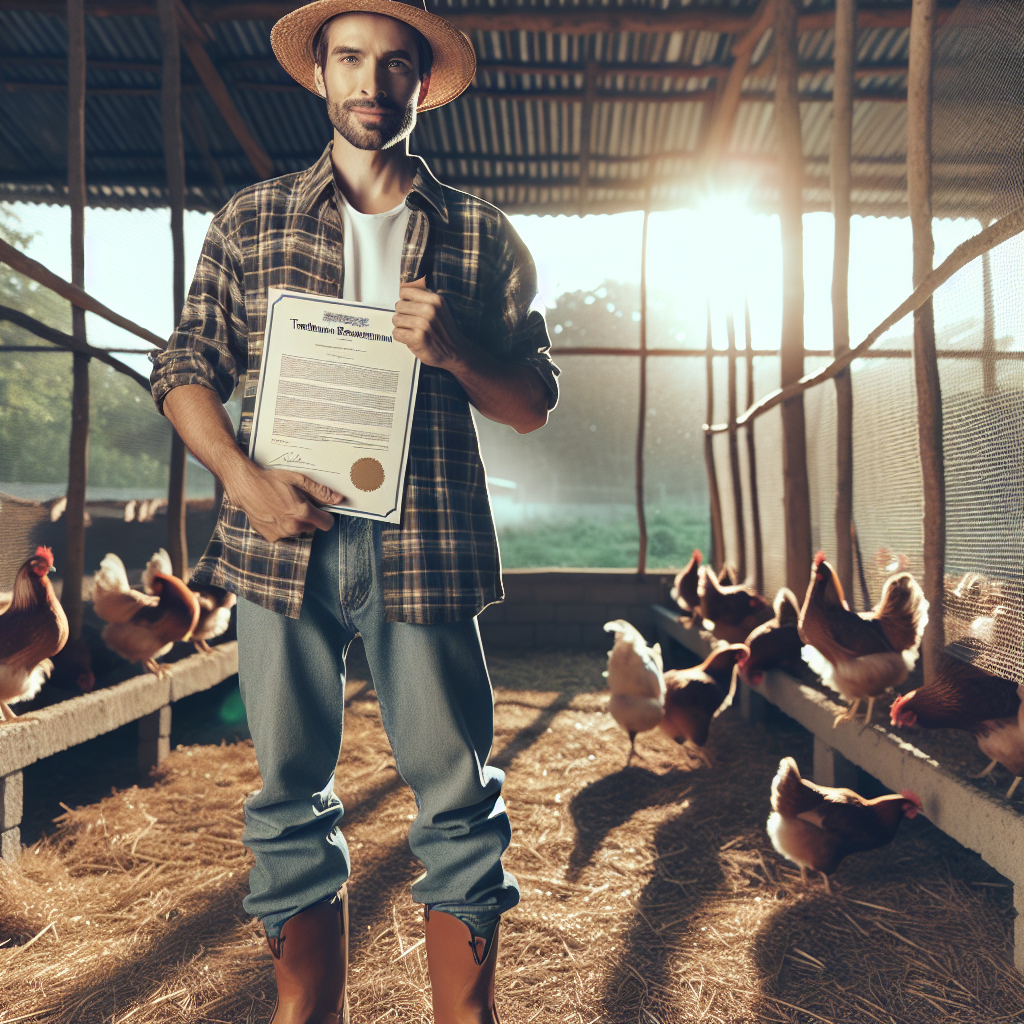Looking to expand your poultry business by venturing into processed products? Before you take the plunge, it’s important to consider the regulatory landscape that comes with diversifying your business. Understanding the regulations surrounding processed poultry items will ensure that you are compliant with food safety standards and will help you navigate the necessary steps for product development, labeling, and marketing. In this article, we’ll explore the key regulatory considerations you need to keep in mind when diversifying your poultry business and entering the exciting world of processed products.
Food Safety Regulations
Hazard Analysis and Critical Control Points (HACCP)
When diversifying a poultry business into processed products, one crucial regulatory consideration is the implementation of Hazard Analysis and Critical Control Points (HACCP) systems. HACCP is a science-based approach to food safety that identifies and controls potential hazards throughout the production process. By conducting a thorough hazard analysis, businesses can establish critical control points to prevent, eliminate, or reduce risks. This systematic approach ensures that every step of the manufacturing process is assessed and monitored to uphold food safety standards.
Sourcing and Quality of Ingredients
To ensure the safety of processed poultry products, it is essential to maintain strict regulations on the sourcing and quality of ingredients. Businesses must establish protocols for selecting suppliers who meet specific food safety criteria and adhere to relevant regulations. Thoroughly screening suppliers, implementing quality assurance programs, and conducting regular audits can help guarantee the safety and integrity of the ingredients used in the production process.
Product Labeling and Packaging
Accurate and transparent product labeling is a critical consideration when diversifying a poultry business into processed products. Clear and concise labeling helps consumers make informed choices about the products they purchase. Regulatory guidelines often require detailed information on ingredients, nutritional values, allergen declarations, and expiration dates. Adhering to these labeling requirements ensures that consumers are well-informed about the product they are purchasing, promoting transparency and trust in the brand.
Traceability and Recall Procedures
Establishing robust traceability and recall procedures is another vital aspect of food safety regulations when venturing into processed poultry products. Traceability systems enable businesses to track ingredients from their sources to the final product, providing accountability and transparency. In the event of a product recall or safety issue, having well-defined recall procedures ensures prompt and effective corrective actions can be taken to protect consumer health and safety. These procedures should include clear communication channels, documentation, and collaboration with regulatory authorities to swiftly address any potential food safety concerns.
Product Development and Processing
Research and Development
When entering the world of processed poultry products, investing in research and development becomes crucial. Undertaking scientific research and experimentation is necessary to ensure the quality, safety, and innovation of the new product offerings. This phase involves recipe development, taste testing, and determining optimal production processes. Complying with regulatory guidelines throughout this stage helps ensure that the final product meets all food safety standards while also meeting consumer preferences.
Processing Equipment and Facilities
Adequate processing equipment and facilities are essential for maintaining the safety and quality of processed poultry products. Equipment must be regularly inspected, maintained, and calibrated to ensure proper functioning and prevent contamination. Facilities should meet specific hygiene and safety standards, such as implementing procedures for waste disposal, maintaining adequate ventilation, and preventing cross-contamination. Adhering to these regulations guarantees that the processing environment is conducive to producing safe and high-quality products.
Product Formulation and Recipe Approval
Before launching processed poultry products, businesses must obtain recipe approval from regulatory authorities. This process involves submitting detailed information about the product’s ingredients, formulation, and processing methods. Regulatory agencies review this information to ensure compliance with safety regulations and provide necessary approvals. Obtaining recipe approval ensures that the product meets all necessary safety and quality standards.
Sanitation and Hygiene Practices
Maintaining optimal sanitation and hygiene practices is critical when diversifying a poultry business into processed products. Businesses must establish and implement comprehensive sanitation programs that include regular cleaning schedules, disinfection procedures, and personal hygiene protocols for employees. Adhering to these practices mitigates the risk of contamination and helps ensure the production of safe and hygienic processed poultry products.
Licensing and Permits
Business License
When venturing into processed poultry products, obtaining the necessary business licenses is a primary regulatory consideration. Business licenses vary based on the geographical location and the specific product offerings. These licenses are issued by local or state authorities and demonstrate that the business is compliant with all relevant regulatory requirements. Ensuring that the business has the necessary licenses is essential to operate legally and maintain consumer trust.
Food Service Establishment Permit
In addition to the general business license, a food service establishment permit specifically focuses on the production and packaging of food products. This permit ensures that the facilities and procedures employed meet the required food safety guidelines. Obtaining a food service establishment permit indicates that the business has been inspected and approved by regulatory authorities for producing safe and hygienic processed poultry products.
Processing Plant License
For businesses involved in large-scale production of processed poultry products, acquiring a processing plant license is crucial. This license indicates compliance with regulations regarding the manufacturing, processing, and handling of food products within a specific facility. Regulatory authorities conduct thorough inspections to assess the processing plant’s adherence to safety, hygiene, and quality standards. Obtaining a processing plant license assures consumers that the business follows the necessary protocols to produce safe and compliant processed poultry products.
Product-Specific Permits
Certain processed poultry products may require additional permits, especially if they contain specific ingredients or undergo unique processing procedures. Regulatory bodies may impose additional requirements for products such as cured or smoked poultry, value-added products, or products requiring certain preservatives. It is essential to identify and obtain these specific permits to ensure compliance with all relevant regulations for each product being developed.
Health and Safety Regulations
Employee Health and Training
Maintaining employee health and training programs is a crucial aspect of health and safety regulations in the processed poultry industry. Businesses must provide comprehensive training on personal hygiene, safe handling practices, and the proper use of equipment. Regular health check-ups and monitoring of employees’ well-being are also vital to prevent any potential risks to consumer health. Effective training and health programs promote a healthy and safe work environment while ensuring the production of safe processed poultry products.
Safe Handling and Storage Practices
To prevent contamination and maintain product quality, businesses must establish strict protocols for safe handling and storage of processed poultry products. This includes proper temperature control, segregation of raw and cooked products, and avoiding contact with potential contaminants. Educating employees about safe handling practices, implementing storage protocols, and monitoring temperature control is essential to comply with health and safety regulations and guarantee the integrity of the final products.
Equipment Maintenance and Calibration
Regular maintenance and calibration of processing equipment are essential for ensuring the safety and quality of processed poultry products. Properly functioning equipment contributes to accurate processing temperatures, reducing the risk of bacterial growth or product spoilage. Implementing routine maintenance and calibration schedules, as well as having employees trained to identify equipment malfunctions, allows businesses to address any issues promptly, ensuring the safety of the production process.
Waste Management
Effective waste management practices are necessary for compliance with health and safety regulations in the processed poultry industry. Proper disposal of waste materials, including poultry byproducts and packaging waste, is essential to prevent contamination, odors, and the proliferation of pests. Businesses must establish appropriate waste management protocols, including segregation, storage, and disposal methods, to maintain a clean and safe production environment.
Inspections and Audits
Routine Inspections
Routine inspections conducted by regulatory authorities serve as a key component of ensuring compliance with food safety regulations. These inspections involve assessing various aspects of the processing facility, including equipment, hygiene practices, storage conditions, and employee training. By maintaining high standards and being prepared for routine inspections, businesses can demonstrate their commitment to food safety and build trust with regulatory authorities.
Third-Party Audits
In addition to routine inspections, businesses may opt for third-party audits to gain an objective evaluation of their processes and compliance with regulations. These audits are conducted by independent organizations specializing in food safety and quality management. Third-party auditors thoroughly assess all aspects of the facility, including production processes, documentation, traceability, and hygiene practices. Engaging in third-party audits provides an additional layer of assurance to consumers and regulatory authorities that the business is committed to maintaining the highest standards of food safety.
Government Compliance Checks
Government compliance checks are conducted by regulatory agencies to ensure businesses’ adherence to all applicable food safety regulations. These checks may include reviewing documentation, conducting interviews with employees, and inspecting production facilities. Non-compliance with these checks can result in penalties or even the revocation of permits, highlighting the importance of consistently meeting regulatory requirements.
Certifications
Obtaining relevant certifications from recognized industry bodies can further demonstrate a business’s commitment to food safety. Certifications such as the Global Food Safety Initiative (GFSI) benchmarks, ISO 22000, or Safe Quality Food (SQF) certification indicate that the business has implemented robust food safety management systems. These certifications serve as valuable endorsements, assuring consumers that processed poultry products meet recognized international standards of safety and quality.
Allergen Control
Identification and Labeling of Allergens
Given the prevalence of food allergies, it is crucial to identify and label allergens accurately in processed poultry products. Regulatory guidelines require businesses to clearly list common allergens, such as eggs, milk, soy, wheat, and nuts, on product labels. Implementing effective allergen control systems during ingredient sourcing, recipe formulation, and production processes helps prevent cross-contamination and ensures that the final product is safe for consumers with allergies.
Preventing Cross-Contamination
To safeguard allergic consumers, processed poultry businesses must have robust protocols in place to prevent cross-contamination. This includes dedicating specific areas, equipment, and utensils for the production of allergen-free products. Preventive measures, such as rigorous cleaning and sanitation procedures, proper storage of allergenic ingredients, and employee training on allergen control, significantly reduce the risk of cross-contact and allergen exposure.
Separate Production Lines for Allergen-Free Products
If a business chooses to produce allergen-free processed poultry products, it is essential to establish separate production lines. These dedicated lines ensure that allergen-free products do not come into contact with allergenic ingredients or residues from other products. By implementing physical barriers and strict operating procedures, businesses can effectively prevent allergen cross-contamination and provide safe options for allergic consumers.
Staff Training on Allergen Control
Properly training employees on allergen control is crucial to prevent incidents and ensure the safety of processed poultry products. Training programs should educate staff about the identification of allergens, proper cleaning and sanitation procedures, and the importance of adhering to designated allergen control protocols. Regular reinforcement of these practices through ongoing training and audits helps maintain a high level of awareness and compliance within the workforce.
Product Testing and Analysis
Microbiological Testing
Microbiological testing is an integral part of ensuring the safety and quality of processed poultry products. These tests detect the presence of harmful microorganisms, such as bacteria, yeast, and molds, which can cause foodborne illnesses. Regular microbiological testing throughout the production process helps identify potential sources of contamination, allowing businesses to implement corrective actions promptly. Complying with microbiological testing requirements ensures that processed poultry products meet established safety standards.
Chemical Analysis
Chemical analysis plays a vital role in ensuring the integrity of processed poultry products. This analysis helps identify and quantify any chemical contaminants, such as pesticides, antibiotics, or heavy metals, that may be present in the final products. Regular chemical analysis helps businesses uphold food safety regulations and guarantees that processed poultry products are free from harmful substances, allowing consumers to enjoy safe and high-quality products.
Nutritional Testing
Nutritional testing is essential to provide accurate and comprehensive information about the processed poultry products’ nutritional content. This testing involves determining the product’s macronutrient composition, vitamin and mineral content, and any claims made on the product label. Compliance with nutritional testing regulations ensures that consumers have access to reliable information about the products they consume, promoting transparency and informed decision-making.
Shelf-Life Studies
Conducting shelf-life studies is crucial to understand the longevity and stability of processed poultry products. These studies involve storing and monitoring products under various temperature and storage conditions to evaluate their quality and safety over time. Compliance with shelf-life study requirements enables businesses to determine appropriate expiration dates and storage recommendations, ensuring that consumers can enjoy the products within the expected time frame while maintaining the highest standards of quality and safety.
Supply Chain Management
Supplier Approval and Evaluation
Effective supply chain management is vital for ensuring the safety and quality of processed poultry products. Businesses must establish robust systems for supplier approval and evaluation. This includes conducting thorough assessments of potential suppliers’ food safety practices, quality control measures, and adherence to relevant regulations. Regular audits and evaluations of existing suppliers help monitor and maintain the integrity of the supply chain, ensuring that only safe and compliant ingredients are used in the production process.
Cold Chain Management
In the processed poultry industry, maintaining a well-managed cold chain is essential to preserve product safety and quality. Cold chain management involves maintaining appropriate temperatures during transportation and storage to prevent microbial growth and spoilage. Businesses must have protocols in place to monitor and record temperature conditions, as well as contingency plans in case of temperature deviations. Adhering to cold chain management guidelines ensures the integrity and safety of processed poultry products throughout the supply chain.
Transportation and Storage Conditions
Proper transportation and storage conditions are critical factors in maintaining the safety and quality of processed poultry products. Implementing protocols for temperature control, separation of raw and cooked products, and preventing damage during transportation are essential to minimize risks. Adequate storage conditions, including appropriate temperature and humidity controls, prevent spoilage and maintain product quality. Compliance with transportation and storage regulations guarantees that processed poultry products reach consumers in a safe and satisfactory condition.
Quality Assurance Programs
Establishing comprehensive quality assurance programs throughout the supply chain is crucial to ensure the safety and quality of processed poultry products. Quality assurance programs set standards for ingredient sourcing, processing, packaging, and storage, including regular inspections and testing. Documenting and monitoring every aspect of the supply chain helps identify potential risks and ensures that the final products consistently meet regulatory requirements and consumer expectations.
Marketing and Advertising Regulations
Truthful and Non-Misleading Claims
Businesses must adhere to marketing and advertising regulations to ensure that claims made about processed poultry products are truthful and non-misleading. Misleading claims can deceive consumers about product attributes, nutritional content, or health benefits. Adhering to regulations helps promote transparency and consumer trust in the brand, ensuring that all marketing materials accurately represent the processed poultry products.
Compliance with Labeling Laws
Labeling laws require businesses to provide accurate and comprehensive information on processed poultry product packaging. This includes ingredient lists, allergen declarations, nutritional information, expiration dates, and clear product names. Compliance with labeling laws ensures that consumers have access to necessary information, enabling them to make informed choices and avoid potential allergens or food safety risks.
Health and Nutrition Claims
Making health and nutrition claims on processed poultry products requires compliance with specific regulatory guidelines. These claims communicate the nutritional benefits or positive impact of the product on health. Businesses must ensure that any claims made are supported by scientific evidence and meet the necessary criteria set by regulatory authorities. Accurate and substantiated health and nutrition claims assist consumers in making well-informed decisions about the products they purchase.
Advertising to Children
When marketing processed poultry products, businesses must comply with regulations regarding advertising to children. These regulations aim to protect children from misleading or manipulative marketing tactics. Businesses must avoid using deceptive imagery, exaggerated health claims, or tactics that may influence children’s food choices inappropriately. Adhering to advertising regulations ensures ethical marketing practices and promotes the well-being of children.
Environmental Regulations
Wastewater Discharge
Compliance with environmental regulations is crucial for minimizing the impact of processed poultry production on water resources. Proper wastewater discharge management involves implementing treatment systems and monitoring wastewater quality to ensure compliance with established standards. Employing efficient water management practices helps safeguard the environment, prevent pollution, and promote the sustainable development of the processed poultry industry.
Solid Waste Disposal
Responsible and sustainable solid waste disposal is a significant consideration when venturing into processed poultry products. Implementing recycling programs, composting organic waste, and effectively managing packaging materials are essential practices to reduce the environmental footprint. Following solid waste disposal regulations supports environmentally friendly practices and demonstrates an organization’s commitment to sustainability.
Air Emissions
Minimizing air emissions is a key aspect of environmental regulations in the processed poultry industry. Implementing emission control measures, such as installing appropriate ventilation and filtration systems, helps reduce the release of pollutants into the atmosphere. Operating in compliance with air emission regulations ensures that processed poultry businesses positively contribute to air quality preservation and environmental sustainability.
Energy Consumption and Efficiency
Reducing energy consumption and improving energy efficiency are integral to environmental sustainability in the processed poultry industry. Businesses should explore ways to optimize energy usage and invest in energy-efficient equipment and technologies. Employing energy management strategies, such as regular energy audits and employee training, helps minimize the carbon footprint and ensure a more sustainable future.
In conclusion, venturing into processed poultry products requires careful consideration of various regulatory aspects. Adhering to food safety regulations, such as implementing HACCP systems, sourcing quality ingredients, and ensuring proper product labeling and packaging, is essential. Compliance with health and safety regulations, including employee training, safe handling practices, and equipment maintenance, is vital to ensure consumer safety. Licensing and permit requirements specific to the food industry must be met to operate legally. Allergen control measures, product testing and analysis, and effective supply chain management also contribute to ensuring the safety and quality of processed poultry products. Compliance with marketing and advertising regulations, environmental regulations, and conducting inspections and audits from both government authorities and third-party organizations further strengthen the industry’s commitment to safety, quality, and sustainability. By prioritizing these regulatory considerations, businesses can successfully diversify their poultry operations into processed products while upholding the highest standards of food safety and consumer satisfaction.




